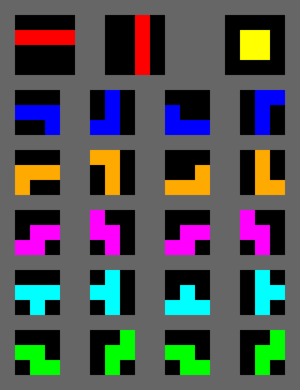Sega Rotation: Difference between revisions
*>Nicholas m Reverted edits by 123.120.152.84 (Talk); changed back to last version by DIGITAL |
|||
| Line 53: | Line 53: | ||
Tetrominoes start out centered, rounding to the left. I goes in columns 3–6 counting from the left, O in columns 4–5, and others in columns 4–6. Each tetromino starts with its topmost solid block in row 20 (or 22 in ''TGM ACE''). | Tetrominoes start out centered, rounding to the left. I goes in columns 3–6 counting from the left, O in columns 4–5, and others in columns 4–6. Each tetromino starts with its topmost solid block in row 20 (or 22 in ''TGM ACE''). | ||
Each tetromino is ordinarily spawned flat side up. | Each tetromino is ordinarily spawned flat side up. There is no initial rotation, and no wallkicks. Additionally, the ceiling blocks rotation. | ||
Apart from I and O, all tetrominoes rotate such that the bottom of the tetromino is at the bottom of the piece's bounding box. S and Z rotate between two states so that the center column stays constant. O does not rotate; I rotates between two states as depicted in the illustration. | Apart from I and O, all tetrominoes rotate such that the bottom of the tetromino is at the bottom of the piece's bounding box. S and Z rotate between two states so that the center column stays constant. O does not rotate; I rotates between two states as depicted in the illustration. | ||
| Line 59: | Line 59: | ||
The differences between Sega rotation and [[Nintendo Rotation System]] are that the flat-side-down states of J, L, and T are pushed down by one space, that S and Z round in different directions, that I rounds differently from the other pieces, and that I requires more space under it to rotate to a vertical orientation. | The differences between Sega rotation and [[Nintendo Rotation System]] are that the flat-side-down states of J, L, and T are pushed down by one space, that S and Z round in different directions, that I rounds differently from the other pieces, and that I requires more space under it to rotate to a vertical orientation. | ||
Sega rotation originally used no [[wall kick]]s. [[Arika]] took Sega rotation, added mild wall kicks, and ended up with [[TGM Rotation]], or Arika Rotation System. In addition to the TGM series, most arcade games developed in Japan before the guideline followed the Sega rotation rules with varying degrees of wall kicks, such as [[Flash Point]], [[Bloxeed]], [[Sega Tetris]], and the [[Tetris Plus]] series. | Sega rotation originally used no [[wall kick]]s. [[Arika]] took Sega rotation, added mild wall kicks and initial rotation, and ended up with [[TGM Rotation]], or Arika Rotation System. In addition to the TGM series, most arcade games developed in Japan before the guideline followed the Sega rotation rules with varying degrees of wall kicks, such as [[Flash Point]], [[Bloxeed]], [[Sega Tetris]], and the [[Tetris Plus]] series. | ||
== References == | == References == | ||
Revision as of 23:33, 15 March 2008
Sega rotation is a rotation system that has been used by Sega's arcade version of Tetris and its successors.
Colors
Games using TGM/Sega rotation generally uses the following color scheme:
| I: red |
| |
| J: blue |
| |
| L: orange |
| |
| O: yellow |
| |
| S: magenta |
| |
| T: cyan |
| |
| Z: green |
|
Basic rotation

Tetrominoes start out centered, rounding to the left. I goes in columns 3–6 counting from the left, O in columns 4–5, and others in columns 4–6. Each tetromino starts with its topmost solid block in row 20 (or 22 in TGM ACE). Each tetromino is ordinarily spawned flat side up. There is no initial rotation, and no wallkicks. Additionally, the ceiling blocks rotation.
Apart from I and O, all tetrominoes rotate such that the bottom of the tetromino is at the bottom of the piece's bounding box. S and Z rotate between two states so that the center column stays constant. O does not rotate; I rotates between two states as depicted in the illustration.
The differences between Sega rotation and Nintendo Rotation System are that the flat-side-down states of J, L, and T are pushed down by one space, that S and Z round in different directions, that I rounds differently from the other pieces, and that I requires more space under it to rotate to a vertical orientation.
Sega rotation originally used no wall kicks. Arika took Sega rotation, added mild wall kicks and initial rotation, and ended up with TGM Rotation, or Arika Rotation System. In addition to the TGM series, most arcade games developed in Japan before the guideline followed the Sega rotation rules with varying degrees of wall kicks, such as Flash Point, Bloxeed, Sega Tetris, and the Tetris Plus series.